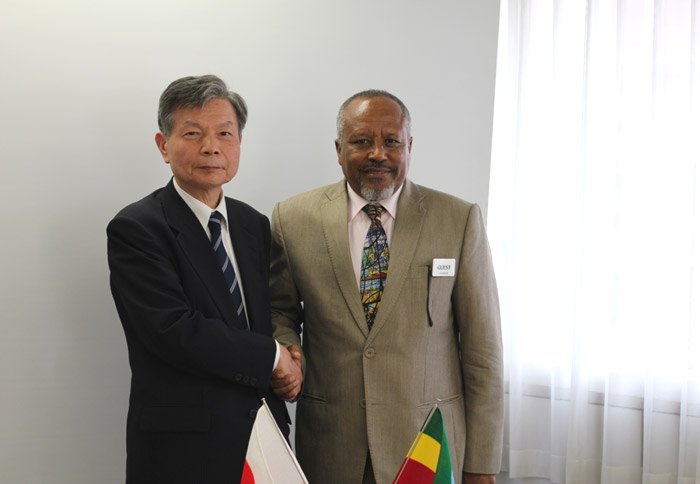Visit of Delegate from Ethiopian Kaizen Institute to JPC
(November 5, 2014)

Mr.Getahun explained Kaizen movement in Ethiopia
Prime Minister Shinzo Abe visited Ethiopia last January and mentioned that "KAIZEN" achieved a big result in Ethiopia, and it became big news even in Japan. Prime Minister Abe announced the policy to support Ethiopian KAIZEN Institute (EKI), which is a Kaizen promoting body of the country, as the Africa's first "Industrial Human Resource Development Center". On October 16, General Director Getahun Tadesse of EKI and Director Bekalu Worku visited Japan Productivity Center (JPC). They explained the present conditions of Kaizen movement in Ethiopia, and revealed the key success factor of KAIZEN movement in the country.
- How has Kaizen been promoted in Ethiopia?
It was the late Prime Minister Meles Zenawi who first took up the idea to apply Kaizen to Ethiopia. Then current Prime Minister Hailemariam Dessalegn follows the policy. A National KAIZEN Council, chaired by the prime minister, was established and the KAIZEN movement has been promoted across the frame of ministries. Since 2009, the Government of Japan (Japan International Cooperation Agency: JICA) has implemented technical cooperation project aiming at capacity building of EKI, training of Kaizen consultants, and promoting Kaizen concepts. The project drives Kaizen movement in Ethiopia. Ethiopian government also declared September as "Kaizen Month" and a National Kaizen Seminar was held last September to publicize various results of JICA project.
- What is EKI and what kind of activities does EKI implement?
EKI was established in 2011, succeeding the function of Ethiopian Kaizen Unit under Ministry of Industry. EKI's activities include promotion of Kaizen concepts, Kaizen consultation to large- medium enterprises, training of vocational trainers who are responsible for development of micro- small enterprises, etc. So far, more than 400 companies have implemented 5S and Kaizen, with assistance of EKI. Initial number of EKI staff was 10, but now it reached to about 100. EKI plans to increase it to 250. It is one of the proofs how the government of Ethiopia regards Kaizen movement as important.
- What is the key success factor of Kaizen movement in Ethiopia?
I think that the leadership of the prime minister and his commitment are the biggest factors. Based on the initiatives of the prime minister, different ministries work together, and necessary management resource to promote Kaizen has been provided for EKI.
In addition, the JICA project enhances the Kaizen movement in Ethiopia, by creating many successful cases of Kaizen implementation in Ethiopian companies, developing human resource on Kaizen, and establishing the system for sustainable promotion of Kaizen movement.

Mr. Getahun, General Director of EKI, and Mr. Matsukawa, President of JPC
- What are the challenges to EKI for the future?
The first is to apply Kaizen concepts to the industries other than manufacturing. In the JICA project, Kaizen was promoted mainly to manufacturing industry. At the moment, EKI started the project on shortening construction period by application of Kaizen to the construction industry. I wish to promote the Kaizen application to service industry and also the public section in future. I think that the methodology of JPC to enhance productivity in service sector is a good example to learn.
The second is application of Kaizen to the higher education. It is essential to incorporate Kaizen concepts in higher education to produce more people with Kaizen awareness. We have started the development of the Kaizen Master Course in collaboration with some universities. And I would like to expand it more in future.
Finally I would like to develop the methods to assess the results of Kaizen by economic and quantitative indicators. For example, we are interested in assessing the impact of Kaizen on the whole value chain of textile industry after applying Kaizen methods. In this regard, there are a lot of learnings from productivity study conducted by JPC.
- What are the elements of Ethiopia appealing for Japanese company?
One element is the fact that the concept of "Kaizen" , which was born Japan, roots in Ethiopia. It became that anyone of the Ethiopian nation has known the word "Kaizen" by Kaizen movement. It may be said to be one of the Ethiopian charms to have excellent people understanding the importance of quality and productivity improvement which is the basis of business management in Japan.
The second is that Ethiopia is located near to India and the Middle East. As the entrance from Asia to Africa, Ethiopia has a geographical advantage for the Japanese companies which would like to operate in Africa.



